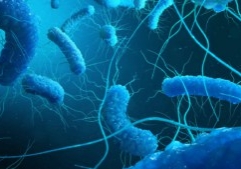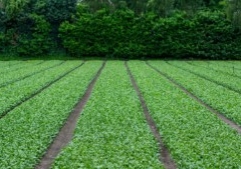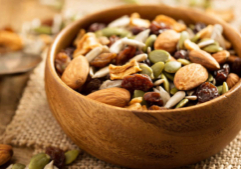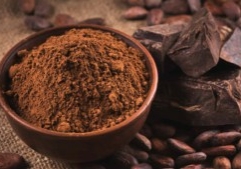The Committee on Food Microbiology is committed to proactively improving the understanding and control of microbial food safety hazards to enable scientifically informed decision making.
The Food Microbiology Committee achieves its mission through supporting sound science, and fostering collaboration between academia, government, and industry.
How are research priorities identified?
In advance of setting priorities for each new research cycle, the committee and its scientific advisors hold a research roundtable with representatives from federal and international agencies. These include: the US Centers for Disease Control and Prevention (CDC), the US Food and Drug Administration (FDA) Center for Food Safety and Nutrition (CFSAN) and Office of Food and Veterinary Medicine; the United States Department of Agriculture (USDA) Agricultural Research Service (ARS), Food Safety and Inspection Service (FSIS), and National Institute of Food and Agriculture (NIFA); the European Food Safety Authority and; Health Canada. The objective of these roundtable discussions is to identify emerging food microbiology research needs considered critical to public health.
COMMITTEE MEMBERS
Conagra Brands
Deibel Labs
General Mills, Inc.
Kraft Heinz Company
Mondelēz International
National Dairy Council
ACADEMIC ADVISORS
Kathleen Glass, PhD, University of Wisconsin
Haley Oliver, PhD, Purdue University
GOVERNMENT LIAISONS
Kristina Barlow, MS, US Department of Agriculture, Food Safety and Inspection Service
Heather Carleton, PhD, Centers for Disease Control and Prevention
Julie Kase, PhD, US Food and Drug Administration, Center for Food Safety and Applied Nutrition
Jodi Williams, PhD, US Department of Agriculture, National Institute of Food and Agriculture
Reference Strain Collection
Established in 2001 for Listeria monocytogenes isolates and housed at Cornell University, the Reference Strain Collection was expanded in 2006 to include the strain set and subtyping data that emerged from the committee’s Cronobacter (formerly Enterobacter) sakazakii projects. A 2008 expansion included the strains set of Salmonella resulting from the committee's Salmonella low-moisture projects. Isolates from the collection are available for a minimal charge to investigators around the world. This unique resource provides investigators with a standard set of isolates that improves comparison of research data. The Food Microbiology Committee continues to support the expansion of the strain collection.
Projects Supported by the Committee:
Publications
Thermal Resistance of Listeria monocytogenes in Natural Unsweetened Cocoa Powder Under Different Water Activity
Food Control, 2019
Survival of Listeria monocytogenes During Storage on Dried Apples, Strawberries and Raisins at 4°C and 23°C
International Journal of Food Microbiology , 2020
Study found that L. monocytogenes survives for at least 1 year on dried strawberries and raisins stored at 4°C but could not be recovered from artificially contaminated dried apples.
Survival and Virulence of Listeria monocytogenes During Storage on Chocolate Liquor, Corn Flakes, and Dry-Roasted, Shelled Pistachios at 4ºC and 23ºC
Journal of Food Protection, 2020
The survival and virulence of Listeria monocytogenes was assessed during storage on three low-moisture foods: chocolate liquor, corn flakes and shelled, dry-roasted pistachios.
Survival and Inactivation by Advanced Oxidative Process of Foodborne Viruses in Model Low-Moisture Foods
Food and Environmental Virology, 2021
Low-moisture foods (LMFs) are generally considered as ready-to-eat products, which undergo no or minimal pathogen reduction steps. However, numerous foodborne viral outbreaks associated with LMFs have been reported in recent years. The objective of this study was to examine the survival of foodborne viruses in LMFs and to evaluate the efficacy of advanced oxidative process treatment in the inactivation of these viruses.
Stability of Listeria monocytogenes in Non-Fat Dry Milk Powder During Isothermal Treatment and Storage
Food Microbiology, 2019
The objectives of this study were to examine the stability of L. monocytogenes in non-fat dry milk (NFDM) during extended storage and further analyze thermal resistance of L. monocytogenes in NFDM under different water activities (aw) and its thermal stability after 1-year storage.
Events
IAFNS at IAFP 2024
July 14, 2024 – July 17, 2024
Long Beach, CA, USA
The IAFP Annual Meeting will feature three by IAFNS in 2024.
IAFNS Food Microbiology Committee Meeting
March 28, 2024
Washington, DC
The Food Microbiology Committee will convene its Spring 2024 Committee Meeting on March 28, 2024.
IAFNS at IAFP 2023
July 16, 2023 – July 19, 2023
Toronto, Canada
Each year, the International Association for Food Protection hosts an Annual Meeting, providing attendees with information on current and emerging food safety issues, the latest science, innovative solutions to new and recurring problems, and the opportunity to network with thousands of food safety professionals from around the globe. IAFNS is proud to support four sessions this year!
IAFP 2021 Annual Meeting
July 18, 2021 – July 21, 2021
Phoenix, Arizona, USA
Each year, the International Association for Food Protection hosts an Annual Meeting, providing attendees with information on current and emerging food safety issues, the latest science, innovative solutions to new and recurring problems, and the opportunity to network with thousands of food safety professionals from around the globe.
IAFP 2020 Annual Meeting
October 26, 2020 – October 28, 2020
Virtual, USA
Each year, the International Association for Food Protection hosts an Annual Meeting, providing attendees with information on current and emerging food safety issues, the latest science, innovative solutions to new and recurring problems, and the opportunity to network with thousands of food safety professionals from around the globe. IAFNS is supporting four sessions at the 2020 IAFP Annual Meeting.
- Martin Wiedmann, Cornell University
- Yan Luo, FDA
- Jessie Heidenreich, Hilmar Cheese Company
Date and Time: Monday, July 17, 2023 from 10:45AM-12:15PM
Event Link: https://iafp.confex.com/iafp/2023/onlineprogram.cgi/Session/8847
Data Sharing in the Digital Age of Food Safety ExpandConvenor: Kathy Glass, University of Wisconsin
Panelist:
- De Ann Davis, Western Growers Association
- Angie Siemens, Cargill
- Sophia Santillana-Farakos, FDA
- James Doyle, Crème Global
- Marie Breton, Health Canada
Date and Time: Monday, July, 17, 2023 from 3:45 to 5:15 PM
Event Link: https://iafp.confex.com/iafp/2023/onlineprogram.cgi/Session/8849
Investigating Ambiguous Outbreaks and Adverse Events ExpandConvenor: Laurie Post (Deibel Labs) and Kelly Dawson (Conagra Brands)
Speakers:
- Craig Hedberg, University of Minnesota
- Tim Jackson, FDA
- Michael Vasser, CDC
- Mitzi Baum, STOP Foodborne Illness
Date and Time: Wednesday, July 19, 2023 from 1:30-3:30 PM
Event Link: https://iafp.confex.com/iafp/2023/onlineprogram.cgi/Session/8835
From Farm to Food: A New Perspective on Heavy Metals in Human Diets Expand Convenor: Paul Hanlon, Abbott Nutrition Speakers:- Benjamin Runkle, University of Arkansas
- Felicia Wu, Michigan State University
- Kevin Boyd, The Hershey Company
Each year, the International Association for Food Protection hosts an Annual Meeting, providing attendees with information on current and emerging food safety issues, the latest science, innovative solutions to new and recurring problems, and the opportunity to network with thousands of food safety professionals from around the globe.
This year, IAFNS Food and Chemical Safety Committee and Food Microbiology Committee are supporting the four sessions at the IAFP Annual Meeting.
Progressing Allergen Risk Management: Thresholds and Quantitative Risk Assessment ExpandJuly 21, 2021, 1:45 PM - 3:15 PM ET
Food allergies constitute a significant public health issue that affects approximately 32 million Americans. The Food Allergy Research and Education (FARE) reports a 377% increase in the diagnosis of anaphylactic food reactions between 2007 and 2016. Although research is ongoing for therapeutics, the primary management for food-allergic consumers is strict dietary avoidance. Food choices, however, may be limited for these consumers because of widespread and inconsistent use of precautionary allergen labeling (e.g., statements such as may contain). The concept of reference doses based on a threshold effect is routinely used in public health risk assessment to inform the approach to risk management. For food allergens, dose response modeling of clinical data from oral food challenges in food-allergic individuals has the potential to inform allergen risk management decisions and drive consistency in allergen labeling. This session will explore the current understanding and application of reference doses for food allergens (derived from the modeling of individual thresholds) and consider what information and tools are needed to progress toward reliable allergen risk assessment and management decisions.
Bayesian Hierarchical Evaluation of Dose-Response for Peanut Allergy in Clinical Trial ScreeningLynne Haber, University of Cincinnati, Cincinnati, OH Occurrence of Allergens in Pre-Packaged Foods in Conjunction with the Use of Precautionary Labeling in Canada: Learnings and Future Directions
Samuel Godefroy, Université Laval, Department of Food Science, Faculty of Agriculture and Food Sciences, Quebec City, QC, Canada Practical Applications of Quantitative Risk Assessment of Allergens
Benjamin Remington, University of Nebraska, Lincoln, NE
This session is supported by the IAFNS Food and Chemical Safety Committee.
Developing Atmospheric Cold Plasma as a Nonthermal Food Safety Tool ExpandJuly 21, 2021, 4:30 PM - 6:30 PM ET
Cold plasma is an emerging technology proposed as a nonthermal process to reduce food safety risks on a variety of foods. Atmospheric cold plasma has a benefit in that it can be applied to packaged foods to reduce surface contaminants such as Salmonella or STEC on fresh fruits and vegetables or L. monocytogenes on high-moisture cheeses. This symposium will present an overview of the technology, examples of inactivating microbes as well as demonstrating it as a novel approach to reduce the presence of mycotoxins on grains. Results from validation studies will be presented and challenges to commercialization will be addressed.
Featured Speakers:
Introduction to Technology, Barriers to Commercialization, Regulatory Approval/Worker SafetyBrendan Niemira, PhD, USDA Agricultural Research Service Case Study: Inactivation of Aflatoxin/Grains
Kevin Keener, PhD, University of Guelph Case Study: Inactivation of Listeria monocytogenes in Soft Cheese
Melha Mellata, PhD, Iowa State University Case Study: From Bench to Prototype for Fresh Produce Safety
Paula Bourke, PhD, University College Dublin
This event is supported by the IAFNS Food Microbiology Committee.
Advances in Powdered Food Safety and Quality Sampling Plans: Theory, Simulation and Practice ExpandJuly 19, 2021, 11:30 AM - 1:00 PM ET
Powdered products are burdened by low-prevalence, low-level contamination that is typically heterogeneously distributed. Multiple commodities and products could benefit from improved management of these risks as evidenced by outbreaks of foodborne disease linked to dairy powders, wheat and nut flours, and powdered infant formula. This session will focus on advances in powder sampling and provide depth in one well-studied commodity, dairy powder, upon which other commodities may draw analogous lessons.
As manufacturers supply domestic and global markets, they must continue to manage rare microbiological contamination with foodborne pathogens such as Salmonella, chemical contamination with mycotoxins such as aflatoxin, and meet increasingly stringent customer quality requirements for indicator and spore counts, to ensure product compliance with regulatory standards. While product testing is one fundamental component of food safety and quality management, traditional best practices like ICMSF-style manual N60 grab sampling is underpowered when those hazards are at low prevalence and level. Modern technologies like autosamplers provide opportunities to improve practice by automating the process of sample collection. This opens the possibility to take many more, smaller samples with complex stratification and true randomness.
Currently, the food industry is needing improvements in practices to meet safety and quality challenges. This session meets that need by addressing knowledge gaps around the benefits of improved sampling plans, technologies and implementation strategies, using dairy powders as an example case. The session will start with a speaker presenting recent statistical theory modelling powder sampling to define the performance of traditional grab compared to auto sampling approaches. The next speaker will present work simulating dairy powder sampling to better define the variability of sampling plans when applied to specific production and hazard scenarios. Finally, we will hear from an industry speaker providing perspective on the value and practicality of getting this done in a multinational company.
Modelling the Effect of Sampling Methods on Detection Tests for Powdered ProductsRoger Kissling, Fonterra Simulating Production and Hazard Scenarios in Powdered Product Sampling to Improve Food Safety Sampling Plans
Matthew J. Stasiewicz, University of Illinois at Urbana-Champaign Industry Need and Role for Improved Sampling of Powdered Products
Pamela Wilger, Cargill
This session is supported by the IAFNS Food Microbiology Committee.
Emergency Use of Microbial Methods of Detection by Industry - Alternative Routes Proving Fit for Purpose Expand
July 20, 2021, 11:30 AM - 1:00 PM ET
The food safety industry must ensure analytical methods designed to detect hazards are fit-for-purpose for their specific commodities. Meanwhile, the food industry is developing hundreds of new ingredients and products that will require screening for microbial hazards. With the ever-expanding diversity of these food products, what happens when a testing laboratory is presented with an urgent request for testing a matrix that was not included in the method's original validation study? The laboratory is asked to deviate from the intended use of the method by testing a different matrix or a different test portion size.
This situation can occur when a food manufacturer requires a faster turn-around time for product release than their standard method allows, when there is a sudden issue with the performance of a rapid test kit, or if a test kits from the manufacturer are backordered. Do these situations constitute an emergency? Arguably, this upset in product distribution could constitute an emergency in terms of the supply chain which is already under stress due to pandemic disruptions - with real effects on consumer well-being and the economy.
This roundtable will consider the key components required for a matrix validation and acceptable strategies for matrix validation that can be used in emergency situations. What approaches will allow expediency while assuring that the method is fit for purpose?
View Resources and Verification Guidance Documents
Invited panel participants:• Deann Akins-Lewenthal, ConAgra Brands
• Patrick Bird, Technical Consultant, AOAC INTERNATIONAL
• Megan Brown, Eurofins
• Tom Hammack, US Food and Drug Administration
• Kelly Stevens, General Mills
This session is supported by the IAFNS Food Microbiology Committee.
Learn more about the IAFP Annual Meeting.
[post_title] => IAFP 2021 Annual Meeting [post_excerpt] => [post_status] => publish [comment_status] => closed [ping_status] => closed [post_password] => [post_name] => iafp-2021 [to_ping] => [pinged] => [post_modified] => 2022-04-01 15:10:29 [post_modified_gmt] => 2022-04-01 15:10:29 [post_content_filtered] => [post_parent] => 0 [guid] => https://iafns.org/?post_type=event&p=25257 [menu_order] => 0 [post_type] => event [post_mime_type] => [comment_count] => 0 [filter] => raw ) [4] => WP_Post Object ( [ID] => 23427 [post_author] => 291 [post_date] => 2020-03-19 19:22:10 [post_date_gmt] => 2020-03-19 19:22:10 [post_content] => [post_title] => IAFP 2020 Annual Meeting [post_excerpt] => [post_status] => publish [comment_status] => closed [ping_status] => closed [post_password] => [post_name] => iafp-2020-annual-meeting [to_ping] => [pinged] => [post_modified] => 2020-10-27 18:44:18 [post_modified_gmt] => 2020-10-27 18:44:18 [post_content_filtered] => [post_parent] => 0 [guid] => https://iafnsconnect.wpengine.com/?post_type=event&p=23427 [menu_order] => 0 [post_type] => event [post_mime_type] => [comment_count] => 0 [filter] => raw ) ) [post_count] => 5 [current_post] => -1 [before_loop] => [in_the_loop] => [post] => WP_Post Object ( [ID] => 34677 [post_author] => 291 [post_date] => 2024-03-19 09:36:59 [post_date_gmt] => 2024-03-19 13:36:59 [post_content] => [post_title] => IAFNS at IAFP 2024 [post_excerpt] => [post_status] => publish [comment_status] => closed [ping_status] => closed [post_password] => [post_name] => international-association-for-food-protection-annual-meeting-iafns-presentations [to_ping] => [pinged] => [post_modified] => 2024-03-19 10:58:19 [post_modified_gmt] => 2024-03-19 14:58:19 [post_content_filtered] => [post_parent] => 0 [guid] => https://iafns.org/?post_type=event&p=34677 [menu_order] => 0 [post_type] => event [post_mime_type] => [comment_count] => 0 [filter] => raw ) [comment_count] => 0 [current_comment] => -1 [found_posts] => 6 [max_num_pages] => 2 [max_num_comment_pages] => 0 [is_single] => [is_preview] => [is_page] => [is_archive] => 1 [is_date] => [is_year] => [is_month] => [is_day] => [is_time] => [is_author] => [is_category] => [is_tag] => 1 [is_tax] => [is_search] => [is_feed] => [is_comment_feed] => [is_trackback] => [is_home] => [is_privacy_policy] => [is_404] => [is_embed] => [is_paged] => [is_admin] => [is_attachment] => [is_singular] => [is_robots] => [is_favicon] => [is_posts_page] => [is_post_type_archive] => [query_vars_hash:WP_Query:private] => da8345e28174ea1e57dd790ff91c1f4d [query_vars_changed:WP_Query:private] => [thumbnails_cached] => [allow_query_attachment_by_filename:protected] => [stopwords:WP_Query:private] => [compat_fields:WP_Query:private] => Array ( [0] => query_vars_hash [1] => query_vars_changed ) [compat_methods:WP_Query:private] => Array ( [0] => init_query_flags [1] => parse_tax_query ) )







